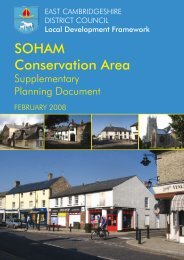East Cambridgeshire District Council Water Cycle Study Detailed ...
East Cambridgeshire District Council Water Cycle Study Detailed ...
East Cambridgeshire District Council Water Cycle Study Detailed ...
You also want an ePaper? Increase the reach of your titles
YUMPU automatically turns print PDFs into web optimized ePapers that Google loves.
Stage 2 <strong>Water</strong> <strong>Cycle</strong> <strong>Study</strong>: Final Report<br />
Sept 2011<br />
4<br />
<strong>Cambridgeshire</strong> Horizons<br />
<strong>East</strong> <strong>Cambridgeshire</strong> – <strong>Detailed</strong> WCS<br />
sources of water (rivers and aquifers) are considered to be at their limits of abstraction before ecosystems<br />
reliant on them would be adversely affected. It is also predicted that climate change will further reduce<br />
available water resources.<br />
In order to reduce reliance on raw water supplies from rivers and aquifers, the <strong>Detailed</strong> WCS has set out<br />
ways in which demand for water as a result of development can be minimised without incurring excessive<br />
costs or resulting in unacceptable increases in energy use. In addition, the assessment has considered<br />
how far development in the <strong>District</strong> can be moved towards achieving a theoretical ‘water neutral’ position<br />
i.e. that there is no net increase in water demand between the current use and after development has<br />
taken place. A pathway for achieving neutrality as far as practicable has been set out, including advice on:<br />
• what measures need to be taken technologically to deliver more water efficient<br />
development;<br />
• what local policies need to be developed to set the framework for reduced water use<br />
through development control;<br />
• how measures to achieve reduced water use in existing and new development can be<br />
funded; and<br />
• where parties with a shared interest in reducing water demand need to work together to<br />
provide education and awareness initiatives to local communities to ensure that people and<br />
business in the <strong>District</strong> understand the importance of using water wisely.<br />
Four water neutrality scenarios have been proposed and assessed to demonstrate what is required to<br />
achieve different levels of neutrality in the <strong>District</strong>. Total neutrality would only be achieved with very highspecification<br />
fittings being retrofitted into existing properties as well as rainwater harvesting and greywater<br />
recycling in new properties. These features can add significantly to build costs and energy use, particularly<br />
greywater recycling and the scenario would require significant uptake of retrofitted devices in existing<br />
homes and businesses.<br />
The assessment concluded that measures should be taken to deliver the first step on the neutrality<br />
pathway by implementing the low scenario, which is generally considered to require a small scale level of<br />
funding and partnership working. Depending on the success of the first step, higher scenarios could then<br />
be aspired to. The following initial measures are therefore suggested by the WCS:<br />
• new housing development must go beyond the minimum requirements of Building<br />
Regulations;<br />
• carry out a programme of retrofitting and water audits of existing dwellings and non<br />
domestic buildings. Aim to move towards delivery of 10% of the existing housing stock with<br />
easy fit water savings devices; and<br />
• establish a programme of water efficiency promotion and consumer education, with the aim<br />
of behavioural change with regards to water use.<br />
Ecological impacts<br />
Although the three WRZs that supply the study area are hydrologically linked to European sites<br />
(particularly the Ruthamford WRZ which is connected to the Nene Washes SAC/SPA & Ramsar site and<br />
Ouse Washes SAC/SPA & Ramsar site) and other wildlife sites, the information provided in the WRMP<br />
indicates that abstractions within the WRZ’s that supply the study area are not likely to lead to a significant<br />
effect on European sites, following limited sustainability reductions that may be required following the<br />
completion of the RoC process.






